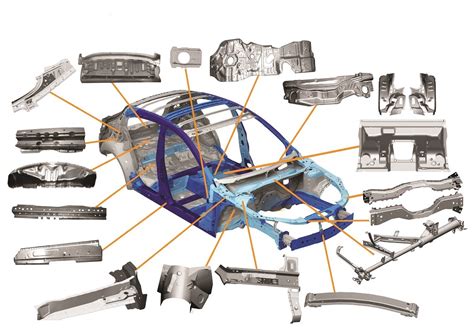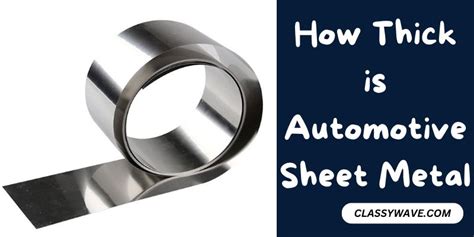car body sheet metal material From Body-in-White (BIW) to frames, structural reinforcements, and closure panels: sheet metal is a vital material offering strength, durability, and aesthetic appeal. A vehicle’s BIW and frame use sheet metal to provide the . GearIT 7 Way Plug Inline Trailer Cord (8 Feet) with 7 Gang Junction Box - Weatherproof Wiring Harness Cable with Waterproof Junction Box for RV Trailers and Campers - 8Ft
0 · replacement auto body sheet metal
1 · car sheet metal thickness mm
2 · automotive sheet metal thickness
3 · automotive sheet metal near me
4 · automotive replacement sheet metal
5 · aftermarket sheet metal car parts
6 · aftermarket sheet metal body parts
7 · aftermarket automotive sheet metal parts
Find company research, competitor information, contact details & financial data for Trenton Sheet Metal, Inc. of Trenton, NJ. Get the latest business insights from Dun & Bradstreet.
Making an informed decision about using automotive sheet metal fabrication comes from understanding the process. As a result, this article discusses car sheet metal manufacturing and how you choose it to make . Sheet steel – The most used in previous generation for the most part of the body. Even here there are classifications such as cold rolled and hot rolled low carbon steel with . Automotive sheet metal fabrication involves high-precision manufacturing techniques that enable the automotive industry to grow and produce quality parts while .
From Body-in-White (BIW) to frames, structural reinforcements, and closure panels: sheet metal is a vital material offering strength, durability, and aesthetic appeal. A vehicle’s BIW and frame use sheet metal to provide the .
With a typical thickness ranging from 0.5 millimeters to 6 millimeters, sheet metal is a choice material in the automotive industry for its lightweight yet sturdy characteristics, enhancing both efficiency and safety.The main parts of the car body are made of steel, aluminum alloys, plastics, and glass. Moreover, the advantage is given to low-carbon sheet steel in the thickness with thickness impact. In this article, you learn how the automotive sheet metal design system evolves & the development of different parts from scratch.
The undulating curves of a sports car or the robust stance of an SUV—all are intricately shaped by the hands of sheet metal artisans. While the visual appeal is undeniable, .The main parts of the car body are made of steel, aluminum alloys, plastics, and glass. Moreover, the advantage is given to low-carbon sheet steel in the thickness with thickness impact.Steel includes not only vehicle bodies, but also engine, chassis, wheels and many other parts. Iron and steel develop the critical components of structure for the bulk manufacturing of vehicles and are low-cost. The best reason for using steel as a body structure is its natural capability to absorb the impact energy produced in a crash. Aluminium: Making an informed decision about using automotive sheet metal fabrication comes from understanding the process. As a result, this article discusses car sheet metal manufacturing and how you choose it to make automotive parts.
Sheet steel – The most used in previous generation for the most part of the body. Even here there are classifications such as cold rolled and hot rolled low carbon steel with different thickness.
replacement auto body sheet metal

Automotive sheet metal fabrication involves high-precision manufacturing techniques that enable the automotive industry to grow and produce quality parts while supporting innovation. Understanding the automotive sheet metal fabrication process is crucial for making informed decisions. From Body-in-White (BIW) to frames, structural reinforcements, and closure panels: sheet metal is a vital material offering strength, durability, and aesthetic appeal. A vehicle’s BIW and frame use sheet metal to provide the necessary structural integrity and rigidity to ensure passenger(s) safety.
phantom pain precious metal boxes
With a typical thickness ranging from 0.5 millimeters to 6 millimeters, sheet metal is a choice material in the automotive industry for its lightweight yet sturdy characteristics, enhancing both efficiency and safety.The main parts of the car body are made of steel, aluminum alloys, plastics, and glass. Moreover, the advantage is given to low-carbon sheet steel in the thickness with thickness impact. In this article, you learn how the automotive sheet metal design system evolves & the development of different parts from scratch.
The undulating curves of a sports car or the robust stance of an SUV—all are intricately shaped by the hands of sheet metal artisans. While the visual appeal is undeniable, body panels contribute significantly to the overall performance and safety of a vehicle.The main parts of the car body are made of steel, aluminum alloys, plastics, and glass. Moreover, the advantage is given to low-carbon sheet steel in the thickness with thickness impact.Steel includes not only vehicle bodies, but also engine, chassis, wheels and many other parts. Iron and steel develop the critical components of structure for the bulk manufacturing of vehicles and are low-cost. The best reason for using steel as a body structure is its natural capability to absorb the impact energy produced in a crash. Aluminium:
car sheet metal thickness mm
Making an informed decision about using automotive sheet metal fabrication comes from understanding the process. As a result, this article discusses car sheet metal manufacturing and how you choose it to make automotive parts. Sheet steel – The most used in previous generation for the most part of the body. Even here there are classifications such as cold rolled and hot rolled low carbon steel with different thickness.
Automotive sheet metal fabrication involves high-precision manufacturing techniques that enable the automotive industry to grow and produce quality parts while supporting innovation. Understanding the automotive sheet metal fabrication process is crucial for making informed decisions. From Body-in-White (BIW) to frames, structural reinforcements, and closure panels: sheet metal is a vital material offering strength, durability, and aesthetic appeal. A vehicle’s BIW and frame use sheet metal to provide the necessary structural integrity and rigidity to ensure passenger(s) safety.
With a typical thickness ranging from 0.5 millimeters to 6 millimeters, sheet metal is a choice material in the automotive industry for its lightweight yet sturdy characteristics, enhancing both efficiency and safety.
The main parts of the car body are made of steel, aluminum alloys, plastics, and glass. Moreover, the advantage is given to low-carbon sheet steel in the thickness with thickness impact. In this article, you learn how the automotive sheet metal design system evolves & the development of different parts from scratch.

The undulating curves of a sports car or the robust stance of an SUV—all are intricately shaped by the hands of sheet metal artisans. While the visual appeal is undeniable, body panels contribute significantly to the overall performance and safety of a vehicle.
automotive sheet metal thickness


persona 5 in metal box
pharsalia metal fabrication
We offer custom metal fabrication. These products can be customized in size and personalized with names, logos, and colors – connect with us today to let us know how we can customize .
car body sheet metal material|aftermarket automotive sheet metal parts